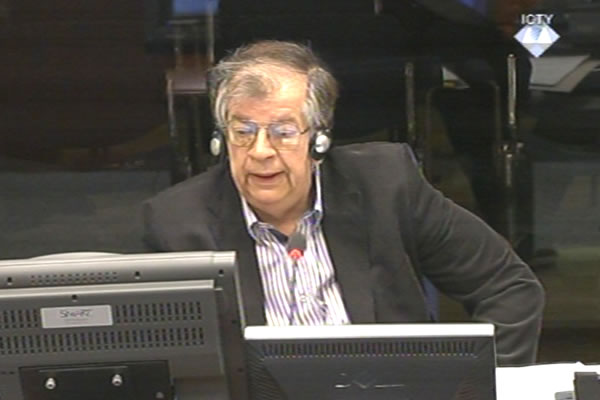Home
NENAD KECMANOVIC – ‘PROPAGANDA VICTIM’
In his evidence in Radovan Karadzic’s defense Nenad Kecmanovic put the emphasis on the crimes against Serbs, relativizing the suffering of Muslims. In the cross-examination the prosecutor showed the former BH politician an interview from August 1992 in which he stated that so far Muslim civilians ‘have suffered the most’. Kecmanovic replied that he fell ‘victim to propaganda’ when he said that
 Nenad Kecmanovic, defence witness of Radovan Karadzic
Nenad Kecmanovic, defence witness of Radovan Karadzic Since the end of the 1980s, Nenad Kecmanovic has been a member of the League of Communists of Yugoslavia, the president of the BH Reformist Party and a member of the BH War Presidency, a postwar Republika Srpska official and finally a defense witness for a number of Bosnian Serbs who were later convicted of war crimes. Now, Kecmanovic is in The Hague again to testify in Radovan Karadzic’s defense. In his statement to the defense, admitted into evidence, Kecmanovic described the accused as a peacemaker who did everything he could to stop the war. Kecmanovic accused the Muslim leadership of starting the conflict. According to Kecmanovic, there was a propaganda campaign to vilify Serbs as criminals and portray Muslims as victims.
Kecmanovic and Karadzic used his examination-in-chief for a showdown with late BH president Izetbegovic. The witness said Izetbegovic was undemocratic and that he ruled through his minions in the party. Outwardly, Izetbegovic advocated a civil state but in actual fact he strove to create a unitary BH under the Muslim control, the witness claimed. According to Kecmanovic, Izetbegovic was ‘pleasant to talk to, but unpleasant to negotiate with’ because he did not implement the agreements consistently. On the other hand, Karadzic’s leadership was ‘more than consistent’ in that regard, Kecmanovic claimed.
In the cross-examination prosecutor Uertz-Retzlaff reminded Kecmanovic that during the war and in particular until June 1992, while he was still a member of the BH Presidency, he spoke differently. In fact, during that period, Karadzic referred to him as ‘Alija’s Serb’ and ‘Ante Pavelic’s Serb’ in a press release. At a Presidency session in late June 1992, the witness said that the gains achieved by capturing the territory and expelling the population couldn’t be accepted. Today the witness tried to relativize the statement, arguing that it was hard to tell when the people were forced to leave and when they left voluntarily.
After he left Sarajevo and went to Belgrade, Kecmanovic gave an interview in late August 1992 to the Borba daily. In the interview Kecmanovic said that the Serbs in Sarajevo were double victims. First, because they suffered ‘in the artillery fighting just as much as the other side’, and second, because they felt collective guilt following the propaganda campaign vilifying Serbs, Kecmanovic told the journalist. In the interview, Kecmanovic did say that Muslims ‘had fewer weapons than any other side, and it is particularly tragic that until now they have suffered the most’. Kecmanovic said that he too fell ‘victim to propaganda’ at the time because he believed that many Muslim civilians had been killed. Later, Kecmanovic learned that the sufferings in BH were ‘proportionate’ to the size of the three ethnic communities. Karadzic asked Kecmanovic if Kecmanovic ever saw in him a desire to achieve the ‘ethnic purity’ in the BH parts under Serb control. Kecmanovic said he did not.
In the first part of the hearing, prosecutor Gaynor completed the ‘artillery stage’ of the cross-examination of Karadzic’s ballistic expert Mile Poparic. Poparic will continue his evidence next week. Prosecutor Edgerton will examine Poparic about the Sarajevo sniper incidents.
Linked Reports
- Case : Karadzic
- 2013-05-30 KARADZIC’S EXPERT: ENTIRE CITY OF SARAJEVO WAS NOT MILITARY TARGET
- 2013-05-29 KARADZIC HIDES BEHIND BUILDINGS, SHRUBBERY AND FOG
- 2013-05-28 CREATING ‘NEW DEMOGRAPHIC PICTURE’ IN REPUBLIKA SRPSKA
- 2013-06-05 KARADZIC’S BALLISTIC EXPERT COMPLETES EVIDENCE
- 2013-06-06 KARADZIC WAS “SAD” BECAUSE MUSLIMS LEFT
- 2013-06-06 ROLE OF ‘FRUIT PICKERS’ IN SREBRENICA MASSACRE
